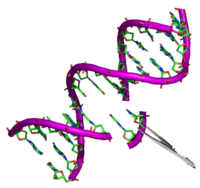
Photo from wikipedia
In this study, a phylogenic analysis was performed on pathogens previously identified in Hong Kong wet markets' cutting boards. Phylogenetic comparisons were made between phylotypes obtained in this study and… Click to show full abstract
In this study, a phylogenic analysis was performed on pathogens previously identified in Hong Kong wet markets' cutting boards. Phylogenetic comparisons were made between phylotypes obtained in this study and environmental and clinical phylotypes for establishing the possible origin of selected bacterial species isolated from wet market cutting board ecosystems. The results reveal a strong relationship between wet market bacterial assemblages and environmental and clinically relevant phylotypes. However, our poor knowledge of potential cross-contamination sources within these wet markets is further exacerbated by failing to determine the exact or presumed origin of its identified pathogens. In this study, several clinically relevant bacterial pathogens such as Klebsiella pneumoniae, Streptococcus suis and Streptococcus porcinus were linked to cutting boards associated with pork; Campylobacter fetus, Staphylococcus aureus, Escherichia coli, and A. caviae in those associated with poultry; and Streptococcus varanii, A. caviae, Vibrio fluvialis, and Vibrio parahaemolyticus in those associated with seafood. Identifying non-foodborne clinically relevant pathogens in wet market cutting boards in this study confirms the need for safety approaches for wet market meat, including cold storage. The presented study justifies the need for future systematic epidemiological studies to determine identified microbial pathogens. Such studies should bring about significant improvements in the management of hygienic practices in Hong Kong's wet markets and work towards a One Health goal by recognizing the importance of wet markets as areas interconnecting food processing with animal and clinical environments.
Journal Title: One Health
Year Published: 2021
Link to full text (if available)
Share on Social Media: Sign Up to like & get
recommendations!